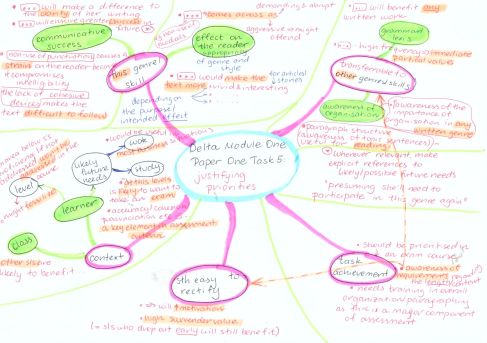My Delta Module One mindmaps are out again, hanging all over my workplace as I’m trying to make sense of work, and as they seem to be just as useful for deconstructing a business meeting as they were for the exam (I got a Distinction), I feel that my approach might be of use for someone else. Here are my top tips for the exam.
First of all, for me, the main challenge of the exam was keeping in mind all the innumerable aspects of each task. The time pressure is crazy (I managed to write 20 pages in 3 hours and got my first ever blister from writing) and it’s just all too easy to draw a blank and completely forget about something important. Another frustrating thing is getting the feel for what Cambridge is looking for (in my first practice exam attempts, at least half of what I put down didn’t feature in the report, and thus would not score a mark in the exam).
The approach that solved these problems for me was creating mind maps for each task. After each exam practice task that I did, I carefully analyzed the guideline answers, trying to squeeze out the general approach to the task and recurrent issues (warning: unfortunately, you can’t do this at the beginning of your studies because there are precious few past papers and you’ll really need them for practice, so you’ll have to build up your analysis as you go along).
The beauty of mind maps is that they highlight the essence of the area that you’re trying to analyse, and also that they are so easy to recall. I went about working with them in the following way:
- I first nailed down the general structure – made sure I could recall the first level; then the first two levels
- I read the map in detail
- Right after reading the map, I tried to reproduce the entire map on an A4 sheet & compared it to the original (I know this seems daunting, and I personally couldn’t talk myself into even trying for a few months, but it gets surprisingly easy after a couple of tries, so my advice is, suspend disbelief and give it a shot)
- I kept reproducing the map for four days (apparently, this is the magic number aka the required amount of time for revision, as neuroscientists say); the frequency is right if each time it’s easier to do that than before
- I structured all my exam practice as a walk around the map, just recalling what nodes there were and trying to come up with something relevant to this particular task for each node
Having done that, you can’t really forget ‘the elephant in the room’ during the exam. After all, the mind map has a shape, it’s visual, and images tend to stick in mind better than lists.
For Paper One Tasks 3 and 5 (and also Task 4 part a), the crucial things to mind map are the components of a genre. Once you remember the main components, there’s bound to be something you can write about more or less for each of these components, so in the exam you just stroll through your map and look for things to write about each of them.
Here are the maps I came up with for Task 5. Again, they look huge, but so long as you remember the first two levels (genre = organization + language; organisation = cohesion + coherence; language = lexis + grammar + style; the effect on the reader = will they understand? what will they feel? will they react the way the learner intends?) and read + reproduce the map instead of trying to memorize it off the sheet, it’s not as bad as it looks.
___________________________________________________

Further reading:
To get a better idea of what’s expected in the exam:
- Delta Module One Handbook, especially the syllabus and the past exam (although I did find that some of the guideline answers there contradicted the guideline answers in later exams)
- Advice on Paper One Task 3 and Task 5 from Sue Swift, who runs a Module One preparation course.
- Lizzie Pinnard’s Delta Exam advice
Once you know what you’re looking for, to learn more and gain confidence in Paper One Tasks 3 and 5:
- Read up on spoken and written discourse – Beyond the Sentence by Scott Thornbury is a good start – and draw up a generic mind map of a conversation. I did this by discussing the mind map with a friend while analyzing our discussion (”Hey, you’ve just made a joke – what for? where does this go on the map?” – ‘Hmm, and you’ve just changed the subject and signaled this by ‘Hey”), which was a lot of fun;
- I also found Writing by Christopher Tribble very illuminating
- Check out how the components of the mind maps are addressed in Writing and Speaking skills sections in General English, Exam Preparation and Business English coursebooks, in order to figure out what is expected of learners in a variety of genres. Also, check contents pages for any mention of genres you know nothing about (do you know what’s expected of a leaflet, for instance?..)
Here are some ideas for practice:
- First and foremost, past papers. If you’re following an exam course, find out when exactly you’re going to practice each task using Cambridge materials. If it turns out that past exams won’t be used until final revision, then draw up your own schedule and spread practice out over at least a couple of months (but make sure you leave the last available exam for a Mock). Practice the same task across several exams, analyzing the guideline answers and looking for the underlying structure; repeat the tasks – right after you’ve analyzed the answers and again in a few weeks. Always time yourself when you practice.
- If you don’t teach a range of writing/speaking genres at the moment, analyze sample exam answers and compare your analysis with examiners’ comments. (Some sample answers are available in FCE/CAE/CPE handbooks, which can be downloaded for free. More are available in past papers published by Cambridge, e.g Cambridge IELTS past exams series.) Some samples of speaking with examiners’ comments on what’s expected and the candidates’ performance are available on youtube, e.g.
- There are lots of forums where learners post their work and get feedback – again, you can analyze real students’ work and compare your analysis with other people’s feedback to see what you’ve missed.
- And here is a whole additional exam with guideline answers, written by Dale Coulter: http://languagemoments.wordpress.com/2012/04/07/delta-module-one-exam-paper-one/
- The best practice is to use this approach in your work – that is, to break down the knowledge needed for any speaking/writing task into the genre components, possibly even share this structure with the students and also show them the importance of being aware of what effect they’re producing in the reader/listener.






